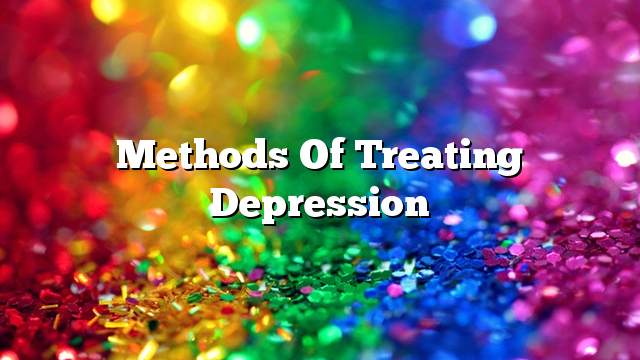depression
Depression is a mood disorder that leads to a permanent feeling of sadness, unhappiness and loss of interest in life. It affects feelings and thoughts and the way the individual acts. It also causes many psychological and physical problems, making it difficult for a person to do the activities he is accustomed to doing. And that life does not deserve to live. Depression is not just a transient seizure; it is a condition that requires time of treatment.
Causes of Depression
There are a number of causes of depression, including:
- Genetics : The risk of depression is greater if there is a family history of the disease, and researchers are currently working on finding genes that may be causing depression.
- Hormones : Hormone disorder may cause changes that may cause depression, especially in women during pregnancy or postpartum, for example.
- Brain chemistry : Recent studies suggest that imbalances in the neurotransmitters that play a role in influencing mood may be a cause of depression.
- Biological causes : Individuals with depression suffer from changes in the brain, as their study can help scientists to know and identify the causes of depression.
Forms of depression
Scientists classified depression in the form of different forms:
- Simple depression : The person suffers from symptoms of severe depression but less sharply for a long period of time, but shorter periods of partial depression.
- Partial depression : A depression that lasts for a long period of up to two years or more, but the symptoms are milder than severe depression.
- major depression : It is a depression that interferes with a person’s ability to work or study, causes sleep problems, problems in appetite and eating, and the ability to enjoy life, and can happen only once in a person’s life, or repeated more than once.
Symptoms of depression
Depression Many symptoms and signs that indicate, which requires that the person suffers every day for at least two weeks to the person that he suffers from depression, and these symptoms:
- Clear changes in a person’s mood and non-behavior.
- Loss of interest in hobbies and activities he loved.
- Low energy, tiredness, slow movement, thinking and speaking.
- Control of sad mood or anxiety, feeling of emptiness.
- Guilt, helplessness, and low self-esteem.
- Difficult thinking, concentration, decision making, and forgetfulness.
- Think about dying or trying to commit suicide.
- Pessimism and despair.
- Loss of appetite and low weight or vice versa; the weight increases and the desire to eat more.
- Sleep disorders such as insomnia, or excessive sleep.
- Headaches and digestive disorders.
Treatment of depression
There are several ways to treat depression or to contribute to the activation of traditional treatments, including:
- Behavioral cognitive therapy : Cognitive behavioral therapy aims to change ideas and behaviors that contribute to depression. Treatment determines how the patient’s relationships affect his or her temperament. Psychosocial psychotherapy helps people understand how their behavior and temperament are affected by unresolved issues and unconscious feelings. Some patients need a few months of treatment, while others need a longer period.
- Drug therapy : Antidepressants that have an effect on the levels of chemicals in the brain are used. There are various types of drugs that are administered by a specialist doctor, determined by their effectiveness, and how to take doses.
- Playing sports : Research suggests that moderate physical activity four or five times a week for about half an hour can help improve mood, increase self-confidence, relieve stress, improve sleep, and increase energy.
- Phototherapy : It is a promising treatment for grief and depression; where the person sits in front of a box of special light that provides either bright or dark light, and can be used light therapy in conjunction with other treatments after consultation with the specialist.
- Pet Therapy : Raising a pet is not a substitute for treatment, but it can relieve symptoms of mild or moderate depression because animals relieve loneliness and provide unconditional love. Recent studies have found that raising pets can reduce sleep problems and improve General health status.
Support the person with depression
To help someone get rid of depression, a person should learn about depression, understand its causes and effects, how it can be treated to be able to help a depressed person, and that the patient must also be patient with the patient and understand that the treatment may take time, To take care of himself and devote time to himself to exercise hobbies and spiritual renewal; so as not to be frustrated by dealing with the patient with depression. There are several things that can be done and presented to a person with depression.
- Encourage him to commit to treatment, to keep the doctor’s instructions, and to remind him of the time of medication.
- Listen to him and show interest in him and desire to understand his feelings, and avoid doing so to give advice or to echoes judgments.
- To provide positive reinforcement and remind him of his positive qualities, and how important and his own status; because the depressed person tends to judge himself harshly and reprimanding himself constantly.
- To assist him and, if possible, take and, if possible, undertake tasks.
- Helping him to adhere to a specific daily protein, making him feel more in control of his life and working to create as stress-free an environment as possible.
- Encourage him to participate in religious and spiritual practices, whether individual or with a group.
- Plan with him and participate in activities or hobbies he previously loved without forcing him.
